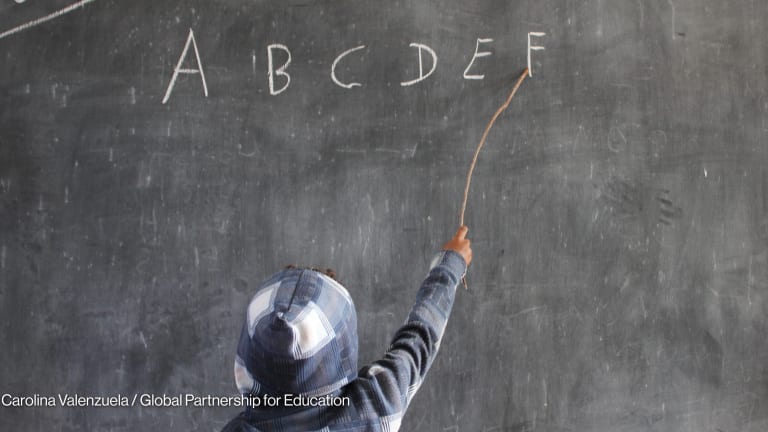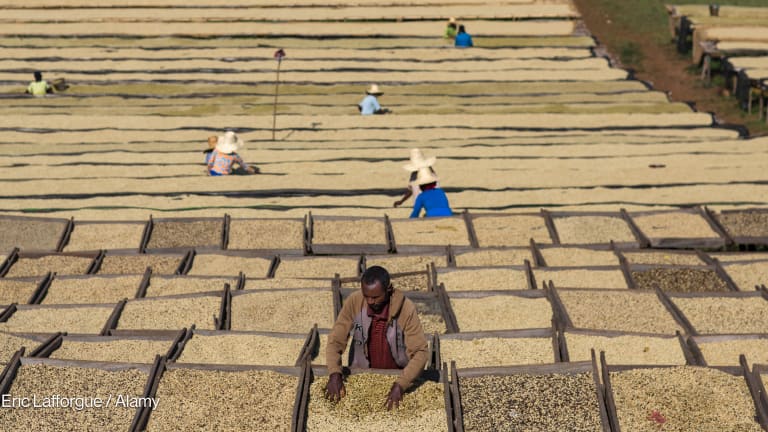EU-Malawi Partnership
In its 2014-2020 partnership strategy with Malawi, the EU boosts support by 80 million euros and will focus assistance on the agriculture, governance and education sectors.
Malawi's finance minister Goodall Edward Gondwe and EU international development commissioner Neven Mimica sign the national indicative program for Malawi for the 2014-2020 period. The EU-Malawi cooperation will focus on three main sectors: governance, sustainable agriculture, and secondary educaiton and vocational training. Photo by: European Commission A low-income country burdened by institutional difficulties within its government, Malawi faces problems in public finance management. Corruption continues to hamper development as well, as evidenced by the recent “Cashgate” scandal. The European Union notes Malawi’s government is characterized by an overly complex structure with overlapping responsibilities between agencies. Further, appointments are highly politicized and weak management in public institutions has led to substandard service delivery. Meanwhile, much of the Malawian population remains largely reliant on agriculture. According to EU data, the sector accounts for 30 percent of gross domestic product, 85 percent of employment and 80 percent of foreign exchange earnings. This dependence, coupled with low productivity and uneven distribution of land, puts Malawi in a deep state of poverty and food insecurity. Malnutrition remains widespread, causing an alarming 42.4 percent stunting rate. EU data also finds undernutrition as the cause of 34 percent of under-5 mortality and 38 percent of maternal deaths. To reduce poverty and improve living standards, Malawi needs to diversify its economy. However, its education system remains weak and incapable of producing a skilled workforce that will fill key positions in high-value industries and attract foreign investors. The government is currently implementing the Malawi Growth and Development strategy. Its main objectives are to build a more robust agriculture sector and produce a skilled labor force in order to reduce poverty, achieve the Millennium Development Goals and promote sustainable growth. The EU has designed its latest national indicative program for Malawi with these national objectives in mind to help stamp out poverty and secure inclusive, continued growth for the sub-Saharan African country. Funding levels and priorities Under the 11th cycle of the European Development Fund, the EU has allocated 560 million euros ($627.93 million) for macroeconomic support, sectoral policies, programs and projects in Malawi. This makes up the EU’s A-allocation for fiscal years 2014-2020. A B-allocation will likewise be available to cover unforeseen expenditures such as humanitarian aid, emergency and post-crisis response, and debt relief contributions. The amount for the B-allocation will be determined as the need arises. Both aid envelopes are subject to midterm and end-of-term reviews and may be adjusted if deemed necessary. This new allocation offers a significant increase from the previous NIP budget, which amounted to 436 million euros. The EU will support program activities in three focus sectors: Governance (120 million euros): This component will advance Malawi’s poverty reduction efforts by consolidating democratic governance, increasing accountability in public institutions and strengthening the rule of law. As good governance is seen as a prerequisite for national growth, the EU will seek to reinforce accountability and transparency in public finance, support public sector reforms that improve the government’s service delivery mechanisms, build institutional capabilities of oversight institutions, strengthen the rule of law and broaden access to justice. Sustainable agriculture (250 million euros): Programs under this component will help Malawi shift to competitive, higher-value production that is both sustainable and inclusive. The EU aims to help Malawi reach higher levels of food security and better nutrition while improving the population’s income. Climate change adaptation will also be a major focus for this component. Secondary education and vocational education and training (160 million euros): The EU intends to help Malawi open up access to secondary education and vocational training especially for girls, build the quality and relevance of training and education, and support managing and governing bodies for secondary education and vocational education and training. EU interventions in these sectors will touch on a number of crosscutting themes, including climate change, water, gender, improving working conditions and the abolition of child labor. A total of 15 million euros will also be allocated for civil society support. This amount will be used for activities that are geared toward enhancing the quality of public service delivery and increasing accountability in this area. Support will also be given to nongovernment institutions to enable them to affect advocacy in service delivery and spur economic development. Meanwhile, another 15 million euros will be spent on support interventions. The EU plans to finance a technical cooperation facility to support the Malawian government in implementing its national development strategy. Support will also be given to the national authorizing officer to aid in the identification, formulation, monitoring and evaluation, as well as auditing of EU programs under this funding cycle. Devex analysis As weak government institutions make for precarious aid delivery, EU’s risk mitigation measures will be centered on close collaboration with all stakeholders. The EU will work with Malawi and its development partners for political discussions and policy dialogues as well as reforms in the judiciary and the public sector. Matters of public finance management will also be discussed with all stakeholders to determine the best approach for interventions in this area. The EU will also support the government by rolling out capacity building and advisory services for oversight of program interventions. In agriculture, the EU will engage stakeholders in sector dialogues to align efforts and maximize impact. Interventions in this area will also involve coordination with the private sector and civil service organizations to expand the reach of assistance. These dialogues will be supported by efforts geared toward deepening government capacity for policy formulation, sectoral analysis and monitoring and evaluation of programs. Similar risk-mitigating measures, including close coordination, collaboration and dialogue, will be undertaken for interventions in the education sector. The EU sees a high probability of climate-induced factors, such as severe droughts and floods, causing food insecurity during the course of this funding period. If such events were to occur, humanitarian assistance will be delivered through financing from the EU’s B-allocation. Although the EU and several of Malawi’s development partners suspended aid in 2013, this latest budget infusion is an encouraging sign. With the new EDF allocation exceeding the previous contribution by 80 million euros, it appears the 28-member bloc remains committed to delivering assistance to its long-time beneficiary for years to come. Contact Delegation of the European Union to the Republic of Malawi Tel: (265) 177-3199 Fax: (265) 177-3534 Email:
Malawi's finance minister Goodall Edward Gondwe and EU international development commissioner Neven Mimica sign the national indicative program for Malawi for the 2014-2020 period. The EU-Malawi cooperation will focus on three main sectors: governance, sustainable agriculture, and secondary educaiton and vocational training. Photo by: European Commission
A low-income country burdened by institutional difficulties within its government, Malawi faces problems in public finance management. Corruption continues to hamper development as well, as evidenced by the recent “Cashgate” scandal.
The European Union notes Malawi’s government is characterized by an overly complex structure with overlapping responsibilities between agencies. Further, appointments are highly politicized and weak management in public institutions has led to substandard service delivery.
This story is forDevex Promembers
Unlock this story now with a 15-day free trial of Devex Pro.
With a Devex Pro subscription you'll get access to deeper analysis and exclusive insights from our reporters and analysts.
Start my free trialRequest a group subscription Printing articles to share with others is a breach of our terms and conditions and copyright policy. Please use the sharing options on the left side of the article. Devex Pro members may share up to 10 articles per month using the Pro share tool ( ).
As former Devex editor for business insight, Aimee created and managed multimedia content and cutting-edge analysis for executives in international development.








